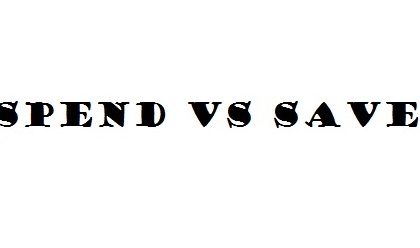You can’t control everything, but what you can control is what you should focus on.
Can you control:
Let’s start with the amount of money you make, your income. Some people will argue with me that they feel that they can control the amount they make over the long run, yes they can plan to make more, but they are not really in control. Employers are in control, the market is in control and heck, even the weather has control over what you could make. You can go back to school and advance your degree, but you still may not land a higher paying job. You can plan on an annual raise but there could be a downturn in the economy or a downturn just in what your company sells and you may not get a raise. I learned this lesson while in school. I was working for a company that was in the process of developing a product for the aerospace industry. I was told that on a certain date my pay would increase and when that date came I did not get the increase. This was due to the company not gaining the contract that they were counting on. You can not rely on what “may or may not” occur. You have to rely on the here and now and make adjustments as things come into fruition.
If you want to get ahead you must control the next three topics.
The amount of money you spend. This seems so simple, but everywhere you turn in today’s modern society you are bombarded with advertisements. You might think that they are harmless but product makers invested nearly $600 Billion worldwide in 2015. The marketers want to continue to get a paycheck from the makers so they use every trick and exploitation they can come up with to get you to buy the products they are marketing. My favorite scam, I have fallen for this many times, is the home mortgage. They convince us that it is the “norm” to spend 25% of our current earnings on a home for the next 30 years. I recommend that if you can not buy your home outright that you spend no more than 10% of your current monthly income on housing. If this means that you will have to rent out a spare bedroom then rent out a spare bedroom. This would give you the other 90% of your income to cover taxes, insurance, food, utilities and all of the other miscellaneous items you spend your money on. The example below is based on a $10.00 per hour yearly wage working 40 hours per week.

As you can see in the example it would only be possible to rent a place with others or to rent a room from others unless of coarse you owned your home outright. With this tight of a budget you can’t afford to get suckered into a credit card, car loan or any other kind of debt. Even doubling the amount of income is really not enough to afford a mortgage in the part of the world I live in. Remember, DO NOT limit your potential by spending your future income today. This is known as “Going Into Debt”. Also, do not spend all that you make.
Time to look at the amount of money you save. Let’s look at the example above. If that was your income, you followed the same budget, you received a 3% raise each year and you received 8% interest on your savings. In 10 years you would be making $27,139 per year and would have saved $38,628. After 20 years, $36,472 and saved $90,542. This is not taking into account you possibly going to school, gaining a trade skill or starting a business. There are many things you can do to greatly aid in raising your income, but I’ll leave that for another post. In the chart I use 15% as a beginning point for savings. Most financial service people will tell you to save up to 15%. It will take you 43 years to be able to retire and live on your savings if you only save 15% of your income. Check out my “Money Plan” posting for more info on savings % vs. years until retirement. The more money you save the better off you will be.
Last but not least, what you do with the money you save. Other than your emergency fund you don’t want to keep your savings in cash. Cash looses value over time. This is due to inflation. Using the chart above, if you kept your savings and we had 2% inflation per year your total after 10 years you would have saved $35,767 but the value of that would only be $32,217. After 20 years it gets a lot worse. You would have saved $83,835 but the value of that would be $69,621. You really need to be investing your saved money into something that actually make more interest than inflation and fees (investments always cost you something). To learn more about this I suggest a book that I recently read “The Simple Path to Wealth” written by J.L. Collins. i think you’ll like it.
As usual, Thank you for taking the time out of your busy life to read this blog post. If you enjoy it and think that others may get something out of this please share the link with them.
Thank you,
The Retirement Dude





This does not make me feel any better at my age. Nonetheless, it sounds sound.
Thank you for your reply. Hopefully you can offer this as advice to younger generations.